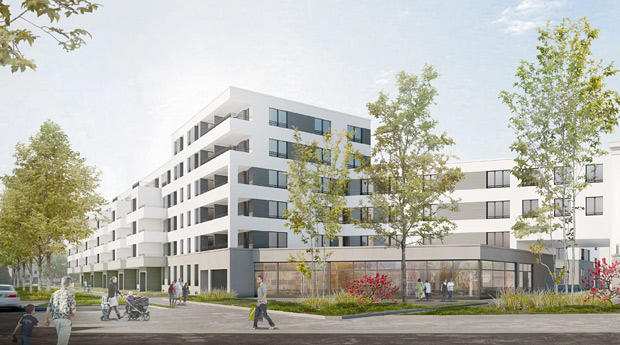|
|
Housing ConstructionHousing Strategy - Expanding the city's quality of life Conceptualisation: Architects Ligne/Neumann/Abbonacci A particular focal point for the Senate during this legislative period is ensuring that housing is a part of our integrated urban development. To this end, Berlin is taking advantage of its right to influence developments by helping mitigate the rise in rents. At first glance, the available scope for action appears to be limited: Conditions on the housing market determine private decisions on the finance and real estate markets. Rental, tax and zoning laws are mostly controlled by federal legislation. In addition, the still very difficult budgetary situation in Berlin limits the possibilities for responding to market developments with financially-impacting public investment, subsidies or transfers. Nevertheless, when it comes to housing and rental policy, Berlin is not without influence. On the contrary, we are making good use of the instruments we have about our disposal. Much has already been implemented and more is to follow. A programme of work for a city worth living in The instruments provided by urban development and planning permission legislation determine what, where and how buildings should be erected. At the state level, the government provides land and supports developers across the board in promoting new residential construction. But that's not all: Berlin has also taken the initiative at the federal level. At the end of 2013, the strategy "Living in Berlin" will combine all these and many other approaches into an ambitious, practical programme of work. The Senate Administration for Urban Development and Environment has commissioned the development of the urban development plan "Living 2025" to serve as a solid professional foundation for this integrated strategy. Measures are being launched The state of Berlin has already set in motion many levers that will provide for this strategy as well as the city's development plan. In this way, the Housing Coordination Centre will pave the way for the rapid realisation of new residential construction with key partners being the six state-owned housing companies. Working together with these firms, the Senate set up an "Alliance for Social Housing Policy and Affordable Rents" in the autumn of 2012. This dialogue is also under way with the more than 80 housing associations in the city. The impetus for this dialogue was a new construction competition in the State of Berlin that came as a result of the state bringing into force a tenancy obligation with regard to social housing. A whole package of measures is also advancing student accommodation. The Berlin Federal Council Initiative on Securing Affordable Rents is being pursued with particular emphasis. And in the summer of 2013, the Senate set in motion a law against the misappropriation of living space. Currently, other measures are also already in the works. The Senate is diligently working to continue and consistently implement its strategy for "Living in Berlin", so that Berlin remains what it is: a forward-looking city in which people can and do want to live. The State of Berlin has already implemented a whole series of measures aimed at achieving the strategy laid out in "Living in Berlin". Others are already under way with the effect that all these measures will be noticeable throughout the city. Even these initial starter projects in residential construction are contributing to a climate of optimism that will serve to convince the undecided that they should become involved. Preventing the loss of existing housing The misuse of existing dwellings thwarts the efforts of all involved to increase the amount of housing stock. This is why Berlin is taking action to counter this. In those areas with a difficult housing market, it will soon only be possible in exceptional, approved instances to convert dwellings into holiday homes or commercial premises. In the summer of 2013, the Senate put forward a corresponding law to the Berlin House of Representatives for a vote. |
|||||
 Leichte Sprache
Leichte Sprache